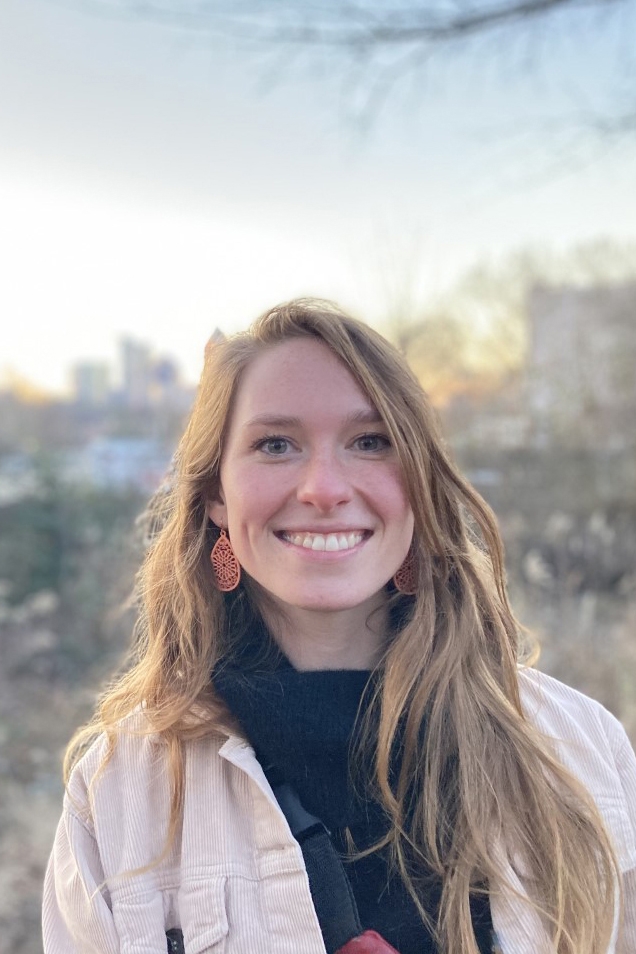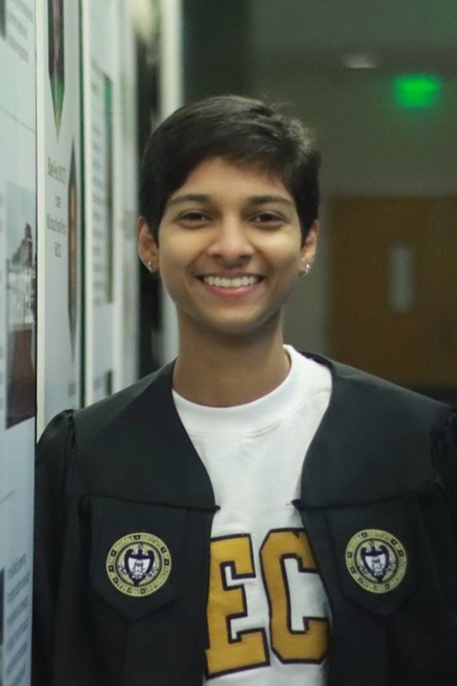Five master’s and Ph.D. students in the School of Civil and Environmental Engineering have been awarded this year’s Dwight D. Eisenhower Transportation Fellowships, a prestigious fellowship program under the Federal Highway Administration.
The annual program awards research grants to graduate students pursuing transportation-related degrees. The program’s mission is to "attract the nation’s brightest minds to the field of transportation, encouraging future transportation professionals to seek advanced degrees, and helping to retain top talent in the U.S. transportation industry.” This year’s winners are creating innovative solutions to pressing infrastructure and transportation concerns, from extreme weather impacts to vehicle risk assessment.
ADAIR GARRETT
PhD student in Civil Engineering
RESEARCH:
Since January 2022, I've been a research assistant in Dr. Adjo Amekudzi-Kennedy's Infrastructure Resilience Group. Resilience has become a huge topic for infrastructure agencies as more and more extreme weather events are making transportation assets unusable. As part of the research group, I'm creating a tool for state departments of transportation (DOTs) to incorporate resilience considerations in long-range transportation plans. State departments of transportation have been open to examining their practices for opportunities for change, so I've enjoyed sharing my work and learning from practitioners. Furthermore, I also work with DOTs to suggest resilience-related metrics for project prioritization mechanisms. My thesis for graduate school is focused on how transportation agencies (including DOTs but also metropolitan planning organizations like Atlanta Regional Commission) can incorporate new practices into existing planning processes to be more resilient to unforeseen events. The long-range planning process is required by the federal government - so how can we use it to our benefit, and what opportunities are there for increased flexibility in the face of uncertainty?
ADVISOR: Adjo Amekudzi-Kennedy

MANDANI TENNAKOON
Master of Science in Civil Engineering
RESEARCH:
The broad range of goals and missions of transportation organizations provide a backbone of how an organization operates when faced with improving resilience needs due to climate vulnerabilities of critical transportation infrastructure. Much research has been done by state departments of transportation (DOTs) to identify risks and vulnerabilities to their transportation assets and identify strategies to better adapt them to rapidly changing and uncertain future conditions. This research project will attempt to understand the adaptation frameworks designed for climate adaptation planning and review the steps and strategies taken by state DOTs to adapt their transportation infrastructure to intensifying and frequent natural hazards and climate risks. The research draws from existing adaptation frameworks developed by the American Association of State Highway and Transportation Officials (AASHTO), the Federal Highway Administration (FHWA), etc. for enhancing agency and asset resilience to natural hazards. The methodology will draw from effective practices implemented by state DOTs and other agencies, tailoring these to be context sensitive to the portfolio of hazards in various planning districts, and to how the hazard exposures are changing. The overall goal of this project is to create a database of various adaptation options to allow decision makers at a regional, district and state level to plan and prioritize resilience improvement projects for their transportation assets. Therefore, the database can be expected to be utilized as a guidebook for transportation planners to refer to understand and identify similar scenarios experienced by other agencies and their responses to reduce asset vulnerability and enhance resilience.
ADVISOR: Adjo Amekudzi-Kennedy

RACHAEL PANIK
PhD Student in Transportation Systems Engineering
RESEARCH:
My dissertation research at Georgia Tech addresses the “missing data” problem in risk assessment for bicyclists and pedestrians: because there is not systematic monitoring of biking and walking, transportation professionals cannot determine which parts of the transportation system pose the highest risk to people biking and walking. Because risk is measured in terms of crashes per person, it isn’t possible to measure risk without knowing how many people are biking and walking in the system. In addition, bicycle and pedestrian crashes are already relatively rare events (i.e., less frequent than vehicle crashes given their smaller mode share), so when “rare” crashes compound with unreliable or assumed estimates of activity, common models used to predict crashes and assess safety become wholly ineffective.
Our research team has partnered with the Georgia Department of Transportation to use existing datasets and strategic counts to create estimates of biking and walking in various contexts in Georgia. We will use machine learning and Bayesian techniques to turn limited counts into models that can predict biking and walking activity in other locations. These estimates will then be used to assess risk for people biking and walking for many places in Atlanta and in Georgia.
ADVISOR: Kari Watkins
REID PASSMORE
PhD Candidate in Transport Systems Engineering
RESEARCH:
My research is on developing a framework for systematically assessing cycling infrastructure improvements using the shortest path model, BikewaySim. This model creates shortest routes that are consistent with the preferences that current and potential cyclists’ have for infrastructure. This framework will help planners and engineers assess the impacts of proposed cycling infrastructure projects, so that projects that stand to have the greatest impact on the actual and perceived safety of cycling are selected over those that would be less effective.
ADVISOR: Kari Watkins

WILL REICHARD
PhD Student, Civil & Environmental Engineering, Transportation Focus
RESEARCH:
AASHTOWare Project Estimation is the primary cost estimation software used by several state departments of transportation. My research proposes to use bootstrap analysis to derive confidence intervals for each item in the AASHTOWare. With this addition, AASHTOWare would be able to report the 5th and 95th (or 10th and 90th) percentile cost estimates, along with the expected cost of a project to decision makers with resource allocation. This research will also assess the potential impact of high-use, high-cost-volatility items on total costs across project types. The analyses will reveal which items are the greatest contributors to total project cost uncertainty and should assist in future policy efforts designed to control costs (perhaps through long-term contracts designed to reduce item cost volatility), thereby reducing transportation project cost uncertainty. The findings generated by this research will improve sustainable transportation life cycle cost estimation, allowing for funding to be used more efficiently and to maximize benefits per capital dollar spent.
ADVISOR: Randy Guensler

